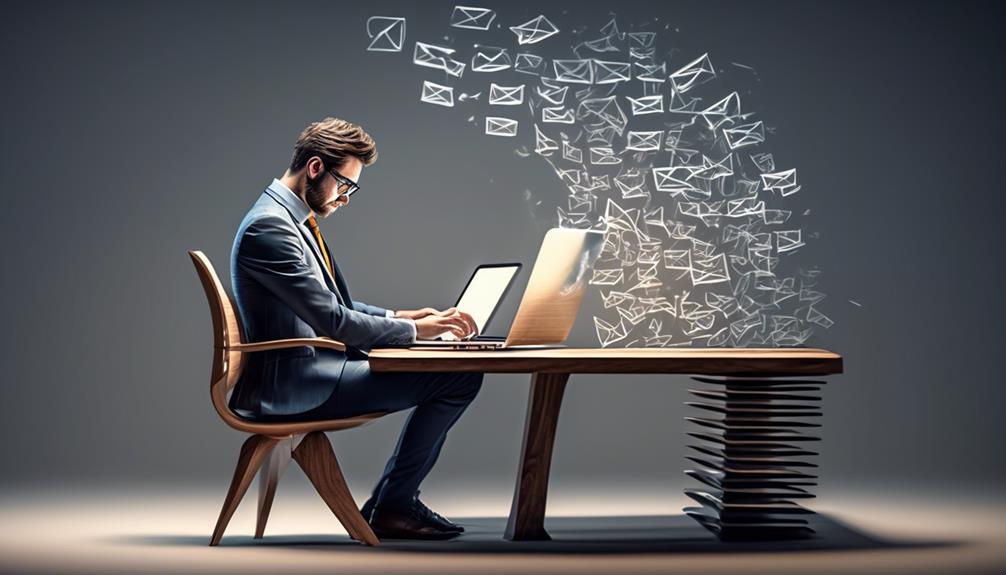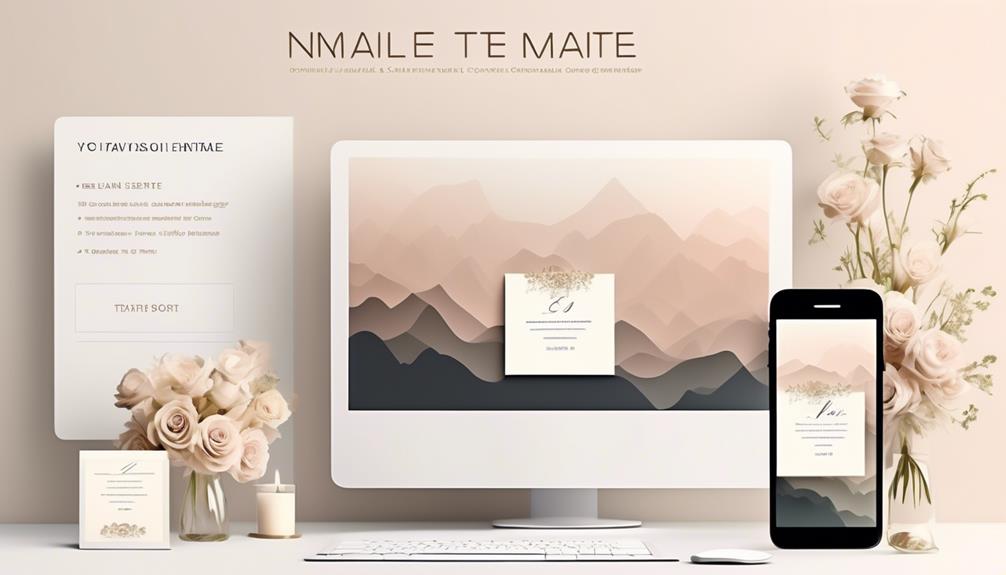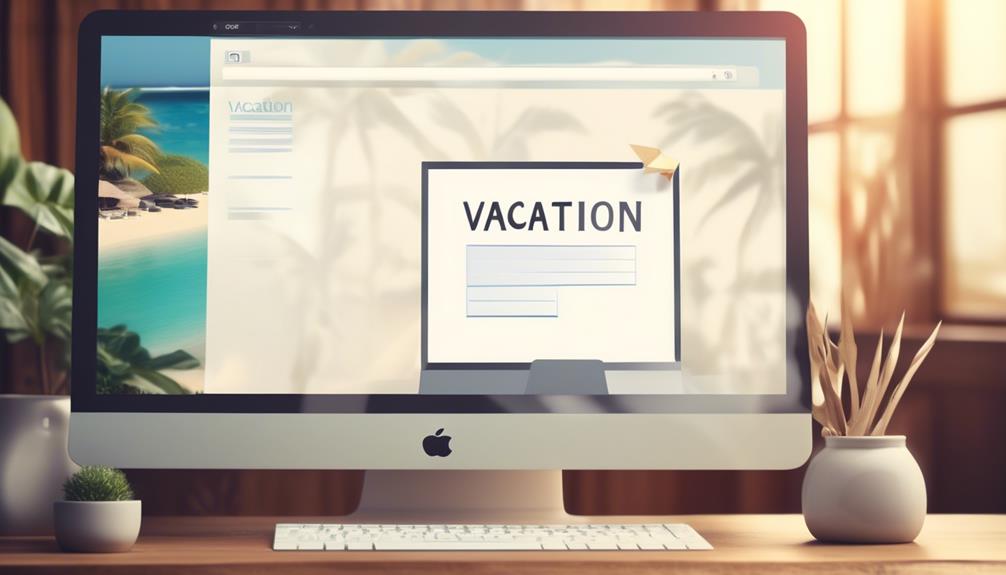Embarking on the journey to secure an internship can often leave you feeling unsure about the best way to reach out to potential employers through email. Nonetheless, with appropriate advice, composing an engaging email can unlock pathways to thrilling prospects.
As we navigate the competitive landscape of internships, understanding the nuances of email communication can make all the difference in standing out to prospective employers.
So, let's dive into the essential elements of composing an impactful internship email that can set you on the path to success.
Key Takeaways
- Researching the company thoroughly is essential before writing an email for an internship.
- Aligning your values with the company's values can make your email more compelling.
- Understanding the company's products, services, and key stakeholders shows your in-depth knowledge.
- Maintaining a polite and professional tone throughout the email is crucial for a good impression.
Researching the Company
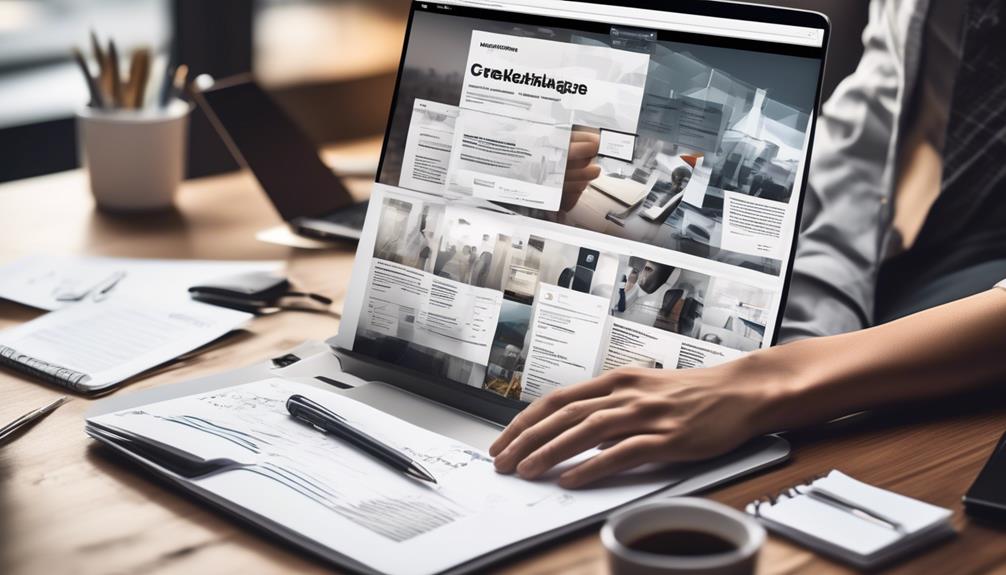
When researching the company for an internship, we should delve into its background, mission, values, and recent news to gain a comprehensive understanding of its culture and objectives. Understanding the company's core principles and recent developments is crucial in demonstrating our knowledge and interest in the email for the internship application.
We need to highlight how the company's values align with our own and how the mission resonates with our career path. Furthermore, researching the company's products, services, and key stakeholders will allow us to speak confidently about how our skills and work experience can contribute to its success. It's also important to review the company's social media presence, employee reviews, and industry rankings to gain insights into its reputation and performance.
This information can be used to showcase our understanding of the company's position in the market and how we can add value during the internship. By researching recent awards, projects, or initiatives the company has been involved in, we can demonstrate awareness and enthusiasm for its activities, ultimately making a compelling case for our fit within the organization.
Crafting a Meaningful Subject Line
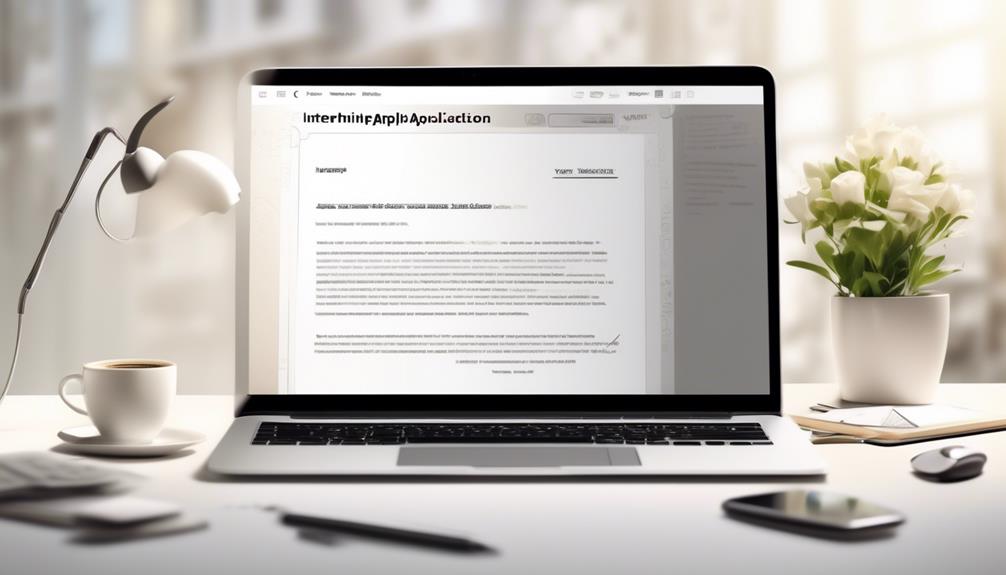
After thoroughly researching the company for the internship application, it's essential to craft a meaningful subject line for the email that captures the recipient's attention and conveys the purpose of our communication effectively.
When crafting the subject line for our internship email, it's crucial to be concise and direct. Tailoring the subject line to the specific internship opportunity, including relevant information such as the time frame and type, can make it more impactful.
To maintain a professional tone, we should use title case and strive to grab the reader's attention. A well-crafted subject line should reflect our genuine interest in the internship, prompting the recipient to open our email.
Keeping the subject line to four to five words ensures it's clear and impactful, avoiding the risk of it being overlooked or misunderstood.
Starting With a Professional Greeting
When beginning an internship email, using a professional greeting sets a respectful tone for the conversation. Addressing the recipient with the appropriate salutation and title, such as 'Dear Mr./Ms./etc. [Last Name]', shows attention to detail and consideration for their position.
It's important to tailor the greeting to the recipient's identity and level of familiarity, ensuring that the email starts off on the right foot.
Polite Email Greeting
In crafting a professional email greeting for an internship application, it's crucial to use appropriate salutations tailored to the recipient's identity and level of familiarity, setting the tone for effective communication.
When emailing individuals, it's important to use 'Dear Mr./Ms./etc. [Last Name]' based on their identity and familiarity. If unsure, address recruiters as 'Dear [First Name] [Last Name]' and professors as 'Dear Professor/Prof. [Last Name].'
For more familiar contacts, a simple 'Hi [First Name]' can be used.
The greeting sets the stage for the rest of the email, so it's essential to ensure it's polite and professional, reflecting your keen interest in the internship.
Professional Salutation
How can we ensure that our professional salutation effectively conveys our respect and sets a positive tone for the rest of the email? When writing an internship request email or internship cover letter, the professional salutation is crucial in creating a favorable first impression. Tailoring the salutation based on the level of familiarity with the recipient is essential. Utilizing formal salutations such as 'Dear Mr./Ms./etc. [Last Name]' demonstrates respect for unfamiliar contacts. On the other hand, using 'Dear [First Name] [Last Name]' or 'Hi [First Name]' is more suitable for familiar or casual contacts. Addressing professors with 'Dear Professor/Prof. [Last Name]' is appropriate. It's important to remember that the professional salutation sets the tone for the entire email, reflecting the level of formality required for the specific job or work experience opportunity.
| Formal Salutation | Familiar Salutation | Addressing Professors |
|---|---|---|
| Dear Mr./Ms./etc. [Last Name] | Dear [First Name] [Last Name] | Dear Professor/Prof. [Last Name] |
Composing Your Message Carefully

Crafting a carefully worded and professional email message is essential to capture the reader's attention and make a strong impression. When composing your email for an internship, consider the following crucial elements:
- Conciseness: Keep the email focused and to the point. Avoid unnecessary details and lengthy explanations, as this can dilute the impact of your message.
- Relevance: Tailor the content of your email to highlight specific details from your cover letter and resume that directly relate to the internship you're requesting. This demonstrates your genuine interest and qualifications for the position.
- Professionalism: Use appropriate business terms and maintain a professional tone throughout the email. An email for an internship should reflect your professionalism and attention to detail.
Highlighting Your Connection

When reaching out for an internship opportunity, it's crucial to highlight any personal connections that you have. Mentioning mutual contacts or interactions can help to establish a sense of familiarity and trust with the recipient.
Emphasizing shared interests or experiences can also demonstrate your genuine interest in the internship and set you apart from other candidates.
Personal Connection Importance
Highlighting your connection in an email for an internship is crucial for capturing the recipient's attention and establishing credibility. When crafting your email, emphasizing the personal connection can significantly increase the chances of making a positive impression.
To effectively highlight your connection, consider the following:
- Clearly state the nature of your connection in the introduction to establish credibility and rapport.
- Demonstrate genuine interest in the recipient and their work to strengthen the personal connection.
- Highlight shared experiences or interactions to deepen the personal connection.
Mentioning Mutual Contacts
Establishing a strong personal connection is essential when reaching out for an internship opportunity, and one effective way to achieve this is by mentioning mutual contacts. When crafting your email, highlighting a mutual contact can significantly enhance your request for an internship. It adds a layer of credibility to your application and demonstrates that you have a connection within the company. This can pique the interest of the recipient and potentially lead to a positive response. Here's a table to help you understand the key elements of mentioning mutual contacts in your internship request email:
| Key Elements | Description | Example |
|---|---|---|
| Express Gratitude | Thank your mutual contact for their assistance and express your appreciation for their support. | "I am grateful for the introduction to your team." |
| Clearly State Connection | Clearly state how you are connected to the mutual contact and how it relates to the internship. | "We worked together at Company XYZ and he recommended your company for my potential career." |
| Connect Positive Attributes | Relate your mutual contact's positive attributes or achievements to your interest in the internship. | "His success at your company inspired me to pursue this opportunity." |
Emphasizing Shared Interests
We are excited to share our genuine enthusiasm for the internship opportunity and connect our shared interests with the recipient's esteemed work.
- Attended a recent webinar hosted by the company where we learned about the innovative projects and technological advancements that align with our passion for engineering.
- Engaged in a conversation with a current employee at a networking event, where we discussed our shared interest in sustainable engineering practices and the company's commitment to environmental sustainability.
- Participated in a hackathon organized by the company, where we collaborated with like-minded individuals to develop solutions for real-world engineering challenges.
Demonstrating Your Interest

To convey our enthusiasm effectively, we should research potential contacts for internship opportunities and carefully plan who to reach out to first, ensuring each email aligns with our goals and purpose. When demonstrating your interest in an internship, it's crucial to personalize your approach and show genuine enthusiasm for the opportunity. Here are some key steps to consider when reaching out to potential contacts for internship opportunities:
| Step | Example |
|---|---|
| Research potential contacts for internships | Utilize online tools, alumni networks, and personal connections to identify potential contacts. |
| Prioritize and plan who to reach out to first | Determine which contacts align most closely with your career goals and the specific internships you are interested in. |
| Customize each email to align with your goals | Tailor each email to demonstrate your knowledge of the company or organization and how your skills and interests align with their mission and values. |
| Clearly state your request and attach your resume | Clearly express your interest in the internship, request an opportunity to discuss further, and attach your resume to provide additional context about your qualifications. |
| Follow up appropriately | If you don't receive a response within a week, follow up with a polite and concise email reiterating your interest and inquiring about the status of your application. |
Making a Specific Request

When making a specific request in an internship email, it's crucial to be clear and concise. By providing necessary details and setting a polite and professional tone, we can effectively communicate our needs and expectations.
This approach ensures that our request is well-received and understood by the recipient.
Clear and Concise Request
Highlight your specific interest in the internship and explain why you're a good fit for the role in a clear and concise manner to effectively convey your request. When making a specific request for an internship via email or cover letter, it's vital to be clear and to the point.
Here are some tips to ensure your request is clear and concise:
- Clearly state the purpose of your request in the subject line to grab the reader's attention.
- Be concise and specific about your request, and attach your updated resume tailored to the role or company.
- Follow up after sending the internship email, expressing continued interest and understanding of the recipient's busy schedule.
Provide Necessary Details
In crafting a specific request for an internship via email, it's crucial to provide necessary details that clearly outline why you're a strong fit for the role and express genuine enthusiasm for the opportunity. When writing an internship cover email, it's important to clearly state your request and be specific about the internship you're applying for.
Demonstrate your knowledge and enthusiasm for the company or internship by mentioning specific details about the organization and how your skills align with their needs. Attach your most up-to-date resume tailored to the role or company in the email to provide the hiring manager with a comprehensive view of your qualifications.
Utilize a complete guide or template to craft your internship request, and ensure that you customize each email for the specific opportunity. Following up after sending the internship email is also crucial, as it allows you to express continued interest in the position or opportunity and potentially secure an internship interview.
Polite and Professional Tone
We are excited to express our genuine interest in the internship opportunity at [Company Name] and are writing to make a specific request for consideration as a potential intern. When making a specific request in an internship email, it's crucial to maintain a polite and professional tone.
Here are some key points to consider:
- Clearly communicate your request for the internship role, demonstrating your enthusiasm for the opportunity.
- Express your interest in the company and the value you can bring to the position, showcasing your passion for the industry.
- Use a respectful and courteous tone throughout the email, ensuring that your message conveys professionalism and maturity.
Crafting a polite and professional email subject and body is essential when sending a cold email for an internship, as it sets the stage for potential career growth and valuable work experience.
Editing for Tone
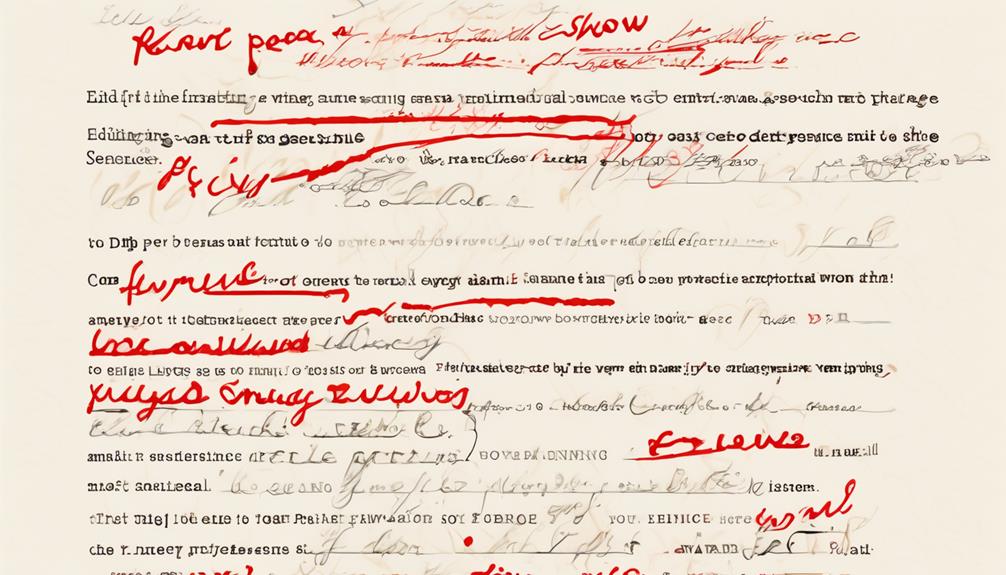
When crafting email communications for an internship, it's crucial to meticulously edit the content to ensure the appropriate tone is consistently maintained throughout the message.
Editing for tone involves carefully considering the purpose and goal of each email. Tailoring the level of formality based on the recipient's relationship is essential, as it allows for the adjustment of language and tone.
It's also crucial to clearly state your connection to the recipient and establish a personal link to convey sincerity and authenticity. Expressing enthusiasm for the internship by aligning your academic interests and long-term goals with the company's mission or the recipient's work is important in maintaining a positive tone.
Moreover, when making a specific request, it's essential to demonstrate an understanding of the internship or company. This can be achieved by attaching an updated resume tailored to the role.
Throughout the editing process, ensure that the language used in the cover letter and resume is consistent with the tone of the email. By meticulously editing for tone, you can effectively convey professionalism and enthusiasm in your email communications for the internship.
Attaching Your Resume
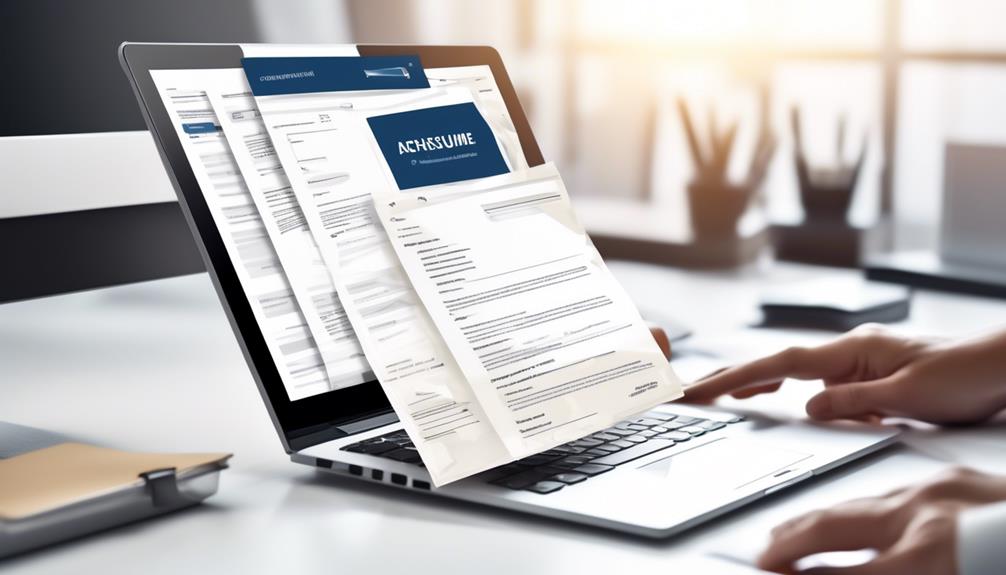
Crafting an email with the appropriate tone is crucial when applying for an internship, and one essential aspect of this is attaching your updated and tailored resume. When sending an email for an internship request, ensure that your resume is updated and tailored to the specific internship and company. This demonstrates your genuine interest and commitment.
Moreover, it's important to clearly label the attached resume with your full name and the internship position you're applying for. This helps the recipient easily identify your application in their inbox. Additionally, save the resume in a widely compatible format such as PDF to ensure ease of access for the recipient. This professional format also maintains the layout and design of your resume.
Lastly, double-check the attachment to avoid sending the wrong file or an outdated version of your resume. Attention to detail is crucial in showcasing your professionalism and dedication to your career. Remember to include a brief note in the email body mentioning that your resume is attached for their review. This simple gesture adds a personal touch to your application.
Understanding the Internship Email Format
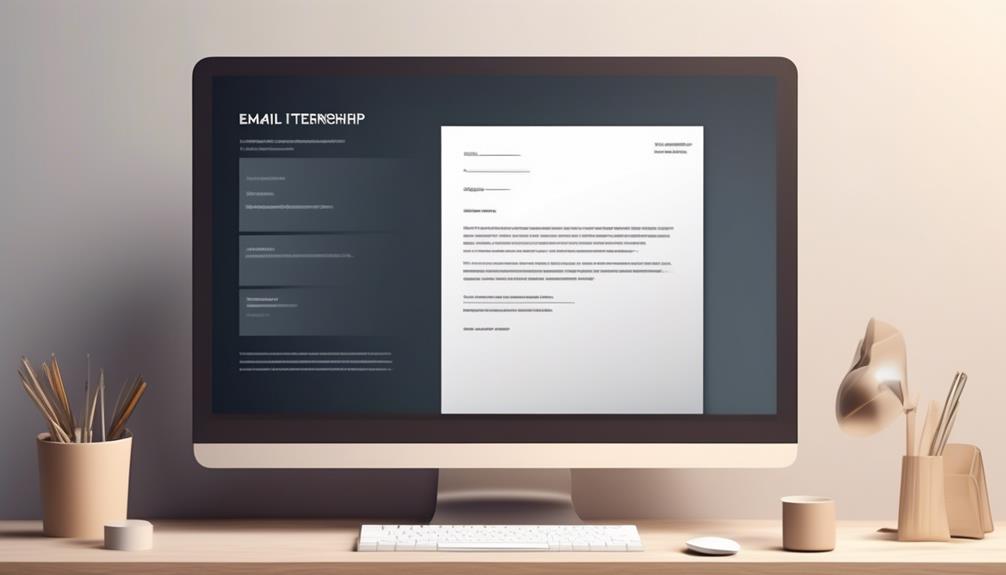
Understanding the format for emailing a prospective internship opportunity is essential for making a positive first impression. When reaching out to potential employers, your email should be professional, concise, and well-structured. Here's a simple guide to understanding the internship email format:
Internship Email Format
| Section | Content |
|---|---|
| Subject Line | Clear and specific |
| Salutation | Formal (e.g., "Dear Mr. Smith") |
| Body | Introduction, purpose, skills, |
| availability, closing | |
| Closing | Professional (e.g., "Sincerely") |
When composing the email, ensure the subject line is clear and specific, such as "Application for Marketing Internship Position". The salutation should be formal, using the recipient's title and last name. In the body, introduce yourself, state the purpose of the email, highlight relevant skills and experience, and express enthusiasm for the opportunity. Close the email professionally, for example, "Sincerely" or "Best regards", followed by your full name.
Understanding the internship email format is crucial when applying for internships. A well-crafted email can set the stage for a successful application and showcase your professionalism and communication skills.
Using Professional Language
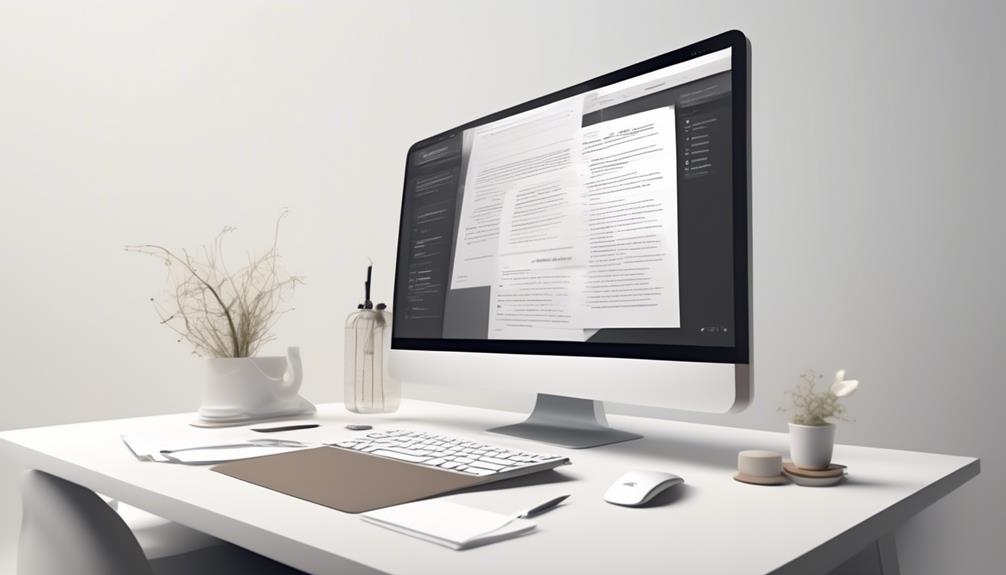
We value the importance of utilizing professional language when composing internship emails to convey a polished and respectful demeanor.
When crafting an internship request, it's crucial to use appropriate salutations and greetings based on the recipient's identity and your level of familiarity. This sets the tone for a respectful and courteous interaction.
Additionally, maintaining a professional and formal tone throughout the email, especially when contacting recruiters or professors for the first time, is essential in creating a positive first impression.
Furthermore, clearly stating who you are and how you're connected to the recipient in the introduction helps establish credibility and builds a foundation for a professional relationship.
Demonstrating knowledge and enthusiasm for the internship or company while making a request showcases your genuine interest and commitment.
By using professional language in your cover letter, resume, and email template, you can effectively communicate your qualifications and respect for the recipient.
What Should I Include in My Email for an Internship Application?
When crafting your email for an internship application, be sure to include key details about yourself and your interest in the position. Utilize these writing internship email tips to make a strong impression on the recipient. Highlight your relevant skills, experience, and enthusiasm for the opportunity in a concise and professional manner.
Frequently Asked Questions
How Do You Write an Email for an Internship?
We write emails for internships by:
- Researching potential contacts
- Using professional greetings
- Maintaining a formal tone
- Clearly stating our identity and connection
- Expressing interest in the internship
- Making a request that aligns with our academic interests and long-term goals
It's essential to:
- Demonstrate knowledge and enthusiasm for the internship
- Convey a genuine interest in the recipient's work
These elements help create a compelling and professional email for an internship.
What Is the Best Email Template for Accepting an Internship?
Accepting an internship is an exciting opportunity. We want to ensure that our response reflects our gratitude and enthusiasm.
We'll tailor our email to convey our appreciation for the offer while also showcasing our readiness to contribute effectively.
We'll clearly state our acceptance and express our eagerness to join the team.
Additionally, we'll inquire about any necessary next steps.
This approach will demonstrate our professionalism and commitment to the internship.
How Do You Ask for an Internship Application Status?
We ask for an internship application status by sending a polite and concise email to the hiring manager or designated contact.
We express our gratitude for the opportunity to apply and inquire about the status of our application.
We mention our enthusiasm for the position and our eagerness to contribute to the company.
It's essential to maintain a professional tone and demonstrate patience while awaiting a response.
How Do I Ask for an Unpaid Internship?
When asking for an unpaid internship, it's crucial to emphasize the value you can bring to the organization.
Highlighting your passion and dedication can help sway the conversation in your favor.
It's important to strike a balance between showcasing your skills and expressing your enthusiasm for the opportunity.
Tailoring your approach to the specific company and industry can also set you apart from other candidates.
Conclusion
In conclusion, crafting an internship email is like planting a seed in fertile soil. With careful research and thoughtful planning, it has the potential to grow into a fruitful opportunity.
By following the outlined steps and maintaining a professional tone, you can effectively communicate your interest and qualifications to potential employers.
Good luck in your internship search!
